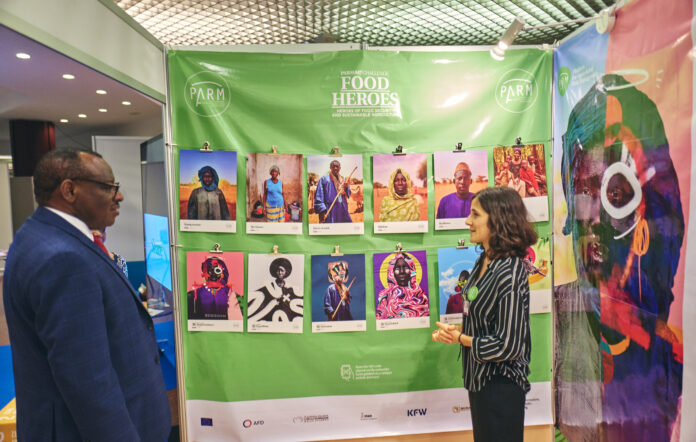The Platform for Agricultural Risk Management (PARM) was present at the Tenth Session of the Africa Regional Forum on Sustainable Development (ARFSD-10) to showcase the results achieved contributing to the achievement of the SDGs, in particular SDGs 1, 2, 13 and 17. The forum was held from 23 to 25 April 2024 at the United Nations Economic Commission for Africa (ECA) in Addis Ababa, Ethiopia.
Through its holistic approach to Agricultural Risk Management (ARM), PARM directly contributes to sustainable agricultural growth, enhancement of rural investment, reduction of food insecurity, and improvement of resilience to climate and market shocks of poor rural households. As the global partnership on ARM, the platform is engaged in further contributing to accelerate the achievement of the SDGs, in particular SDGs 1, 2, 13 and 17. Building on its mandate, the Platform presented, during the ARFSD-10, its results in the achievement of the SDGs. Organized by the United Nations Economic Commission for Africa (ECA), in collaboration with the African Union Commission (AUC), the African Development Bank, and other United Nations agencies, the ARFSD-10 focused in “Reinforcing the 2030 Agenda for Sustainable Development and Agenda 2063 and eradicating poverty in times of multiple crises: The effective delivery of sustainable, resilient and innovative solutions”.
On 24 April, PARM took part in the side event “Harnessing the Potential of Innovative Financing for Comprehensive Africa Agriculture Development Programme (CAADP) Implementation” co-organized with FAO/ECA/UNICEF/IFAD/AU and the Ministry of Agriculture of Ethiopia and in the main session of SDG2 “Zero Hunger”. With its and IFAD’s private sector beneficiary, Enda Tamweel, PARM presented innovative financial initiatives in agriculture and how better managing agricultural risks and agricultural and climate insurance can boost and de-risk investment and foster sustainable access to finance.
During the side event, PARM’s Capacity Development and Private Sector Specialist, Francesca Nugnes, has presented PARM’s holistic approach that suggests the use of a package of tools which are more effective to address intertwined socio-economic and environmental risk. To illustrate it, she mentioned the work done by PARM in Burkina Faso to encourage addressing price volatility through a warehouse receipt system combined with contract farming. Furthermore, she stressed the efforts of PARM to support and promote sustainable agriculture as it aims at moving away from catastrophe response and going towards adopting smart risk management to de-risk investment whilst adopting a holistic approach. Along the discussion, Francesca Nugnes suggested that this would be the right time to carry out an agricultural risk assessment study at regional level (under the guidance of the AUC) in support of the post-Malabo roadmap and Sara Mbago-Bhunu, Director of IFAD’s East and Southern Africa Division, emphasized the need of addressing regional value chains.
Eventually, Fatma Triki, Head of research and studies department at Enda Tamweel has shared an analysis of the main obstacles to financing actors in agricultural value chains, including: (i) Structural obstacles; (ii) Cyclical obstacles; (iii) Specific obstacles in the financial sector; and (iv) Technical obstacles. It is worth noting that Enda Tamweel is a group of institutions that work in the field of financial and social inclusion of poor Tunisian populations. The microfinance company is a beneficiary of IFAD and PARM in Tunisia.
At the main session of SDG2 “Zero Hunger”, Fatma Triki has set forth crucial recommendations and measures to facilitate inclusive financing at national level, through institutional policies that target small-scale farmers at the heart of food systems, and in the microfinance sector to enhance financial inclusion by enabling regulatory framework, authorizing the collection of savings and promoting inclusive insurance services.
In addition, PARM exhibited the beautiful artworks portraying the faces of rural women and rural men that that contribute to Zero Hunger #SDG2 at the knowledge fair launched on 23 April by Mr. Antonio Pedro, Deputy Executive Secretary at ECA who stressed the importance of the fair to showcasing United Nations achievements, for facilitating the cross-fertilization of knowledge products and enabling partnerships. Among the numerous participants of the Forum who came to admire the PARM Art exhibition, PARM had the pleasure to welcome Mr. Claver Gatete, Under-Secretary-General and Executive Secretary at ECA, and make him discover the original pictures of our Food Heroes and their respective transformation into artworks. The impactful and colourful representations of the small-scale farmers that contribute to the resiliency of our agrifood systems despite the risks the face every day, gained high interest among the visitors who happily stopped to know more about the PARM Art Challenge initiative and the Platform’s results.
PARM represents a unique and strategic global multi-stakeholder partnership in the area of Agricultural Risk Management and is funded by the International Fund for Agriculture Development (IFAD), European Commission (EC), French Development Agency (AFD), and Italian Agency for Development Cooperation (AICS).

